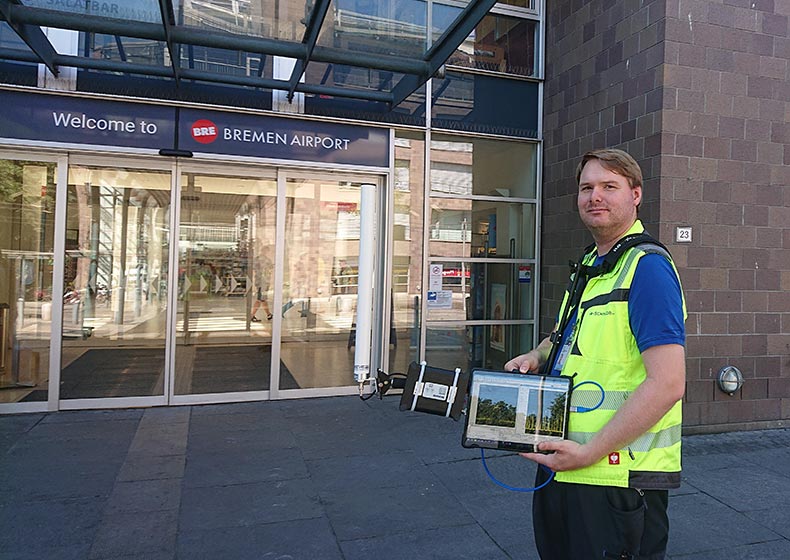聯系我們
與泰克代表實時聊天。 工(gōng)作(zuò)時間:上午 9:00 - 下午 5:00(太平洋标準時間)。
緻電(diàn)我們
工(gōng)作(zuò)時間:上午9:00-下午5:00(太平洋标準時間)
下載
下載手冊、産(chǎn)品技(jì )術資料、軟件等:
反饋
Schnoor Industrieelektronik
Schnoor helps to meet stricter RF Interference test requirements faster with Tektronix spectrum analyzer
'The RSA306B 9kHz-6.2GHz USB spectrum analyzer from Tektronix cuts testing times down from nine hours to nine minutes', reports Ralf Oppermann, Head of Product Management at Schnoor Industrieelektronik. This acceleration is revolutionizing public safety digital indoor coverage radio systems testing in new non-residential buildings.

From its five offices in Germany, Schnoor Industrieelektronik designs and manufactures safety-critical radio communication systems for sectors like industry and energy, maritime and transport (including rail and metro). Founded in 1990, the company is also a major player in public safety and indoor coverage applications, providing also a service to customers as a systems integrator.
In this sector, Schnoor is generally contracted by building owners in order to design, install and perform testing on public safety digital indoor coverage radio systems. Without their certification, these new, non-residential buildings cannot open for business. With increasing requirements for RF measurement tests (including isolation measurements) being introduced in northern regions of Germany, the spectrum analysis activity is becoming ever more time consuming and challenging.
Some of the new radio frequency (RF) tests are becoming “hard to perform” with legacy test equipment and “require a lot of time and in-depth expertise from operators to run them”, according to Ralf Oppermann, Head of Product Management at Schnoor. Average test times with the older and often bulky test equipment span up to nine hours, and there is always the element of human error to take into account when running measurements. The user interface in fact is not particularly user- friendly and requires users to take screenshots in order to track measurement sequences.

"We specialise in safety-critical communication systems,” says Oppermann, “and they must be absolutely reliable. Nine hours is a very long time to carry out one test. It meant we could be working in a building for weeks, which could result in delays in being able to open the building as well as higher costs for the customer."
Finding solutions
Scanning the market, Schnoor looked at the RSA306B 9kHz-6.2GHz USB spectrum analyzer from Tektronix. After an evaluation and training session with a Tektronix application engineer, Schnoor found that the spectrum analyzer could drastically reduce hours of test time down to just a few minutes. Schnoor was so enthusiastic with the results that they promptly requested 15 instrument units for immediate roll-out to field technicians and systems engineers working within digital public safety radio. Almost no trials were necessary for using the RSA306B, which made it quite straight forward to program a setup for complex measurements right before taking the unit into the field.
The RSA connected directly to a PC to run all necessary tests. Opperman found the user interface to be very "intuitive and logical".
He says: "We now use the RSA306B spectrum analyzer every day in the public safety sector where we supply repeater type systems that deliver indoor radio coverage. This is especially important for the fire brigade and police. In this sector, the demand for faster yet precise measurements is ever-increasing, and we as a market leader must give our technicians access to the best equipment available. They have to run multiple tests in sequence so that the coverage systems can achieve full approval, so there’s a lot of pressure to run it as quickly as possible by the public safety agencies."
Ralf continues: "The previous test equipment we had was no longer practical and we needed to do things differently. This particular industry keeps creating new tests at short notice, including very strict qualifying and proving requirements for network coverage measurement. The level of detail in installation and commissioning is much more than with general maintenance, so it became very obvious that our old equipment just couldn’t do the job."
Expanding the benefits to other sectors and regions
For owners of large non-residential buildings – including shopping centres, cinemas, factories, and halls – they have the comfort of knowing that their public safety systems will always comply with the latest requirements, enabling them to keep their facilities open while being able to hold costs down. Requirements for trunk mode indoor coverage systems are very common in Germany; Schnoor has customers running very large systems in tradeshow campuses in Berlin, Hamburg and Düsseldorf. Public safety indoor coverage is also often requested in Sweden, The Netherlands, France and even in the USA.
The easy portability design characteristics make the Tektronix RSA306B perfectly suitable for taking test and measurement anywhere in the world.
"One of the beauties is that it’s such a small and light instrument that you can carry it with you," Ralf says."Technicians are generally equipped with a notebook computer anyway, so their only “extra” is this small but robust box that fits their hand-luggage even if traveling abroad. With traditional test equipment form factor, this simply wouldn’t be possible."
Outside of the indoor coverage sector, Schnoor is looking to use the Tektronix RSA306B in rail transportation RF testing applications, where consolidated test equipment can be up to 15 years old, having no PC interface and needing 230V AC power supply.
"You’re very limited by what you can do with these traditional instruments," says Oppermann. "They are slow, and difficult to work with. That’s why our next rail project we will be using the RSA306B spectrum analyzer and existing stock. This will really change the game."

